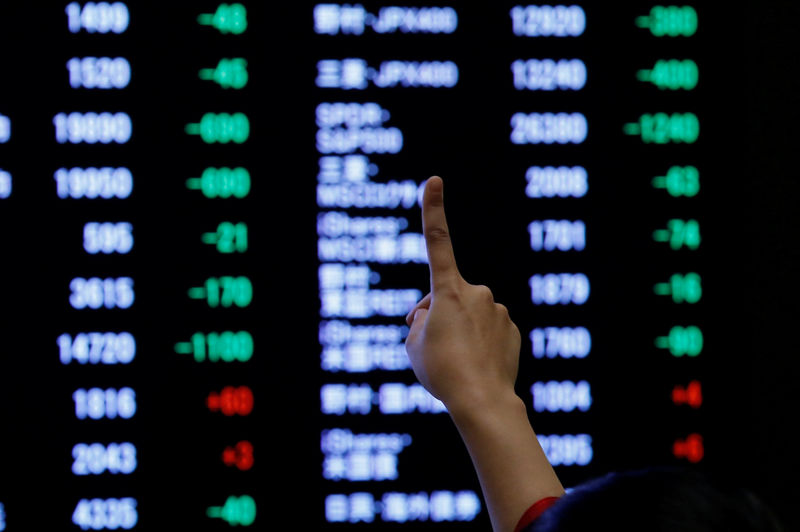By Swati Pandey and Hideyuki Sano
SYDNEY/TOKYO (Reuters) - Asian stocks retreated from six-month highs on Friday as conflicting signals from China and the United States on progress made in trade talks deflated market hopes of a near term truce to end their damaging tariff war.
In a sign of the anxiety, the pan-region Euro Stoxx 50 futures and German DAX futures eased 0.35% each in early European trading while London's FTSE futures slipped 0.24%.
E-mini futures for the S&P 500 were down 0.3%.
The moves contrast with Thursday's surge of optimism in global markets on news Beijing and China have agreed to roll back tariffs on each others' goods as part of the first phase of a trade deal.
Multiple sources familiar with the talks said the plan faced fierce internal opposition at the White House and from outside advisers.
Worries the pact could fall apart as there was still no specific agreement for a phased rollback prompted some investors to sell heading into the weekend.
MSCI's gauge of Asia-Pacific shares outside Japan was off 0.4% at 535.20 points after rising to 538.77, a level not seen since early May. For the week, it is so far up about 2%.
Tokyo's Nikkei, which earlier in the day climbed to a 13-month high, gave up some of the gains to be last up 0.26%. Chinese shares also reversed course from earlier gains with the blue-chip index flat. Hong Kong's Hang Seng index slipped 0.6%.
"The noise coming from Washington DC was not quite so upbeat, with reports of conflicts amongst White House advisors on the merits of the plan," said Jeffery Halley, senior market analyst at OANDA.
"That said, despite the lack of detail and a concrete timeline for even signing an interim trade deal, progress does at least appear to be being made. As ever, the caveat here is the unpredictable nature of the White House."
In commodities, prices for livestock and grains, which have been highly sensitive to any the trade tensions, were subdued across the board.
Soybean futures were little changed on lack of follow-through interest after rallying as much as 1% on Thursday.
Prices of lean hogs, which are expected to be in high demand in China amid a deadly swine fever outbreak, also managed only modest gains before settling near recent lows on Thursday.
Crude oil was also lower with U.S. West Texas Intermediate (WTI) crude losing 22 cents to $56.93 per barrel. Brent was down 11 cents at $62.18.
Safe haven gold, which tends to rise during times of uncertainty, was a tad firmer at $1,469.2 per ounce, having hit a five-week low of $1.460.7 on Thursday.
As investors wound back their buying in safe assets, the 10-year U.S. Treasuries yields jumped to 1.9730% on Thursday to a three-month peak, and last stood at 1.9069%.
Moves in the currency market were restrained.
The dollar was treading water at 109.24 yen, after reaching a five-month high of 109.49 the previous day.
The offshore yuan traded at 6.9779 yuan per dollar, slipping away from a three-month high of 6.9530 per dollar in U.S. trade on Thursday.
The euro was steady at $1.1052, having marked a low of $1.10355 in U.S. trade, its weakest since Oct. 16.

That left the dollar index unchanged at 98.117 after hitting three-week highs of 98.236 on Thursday.